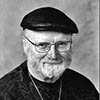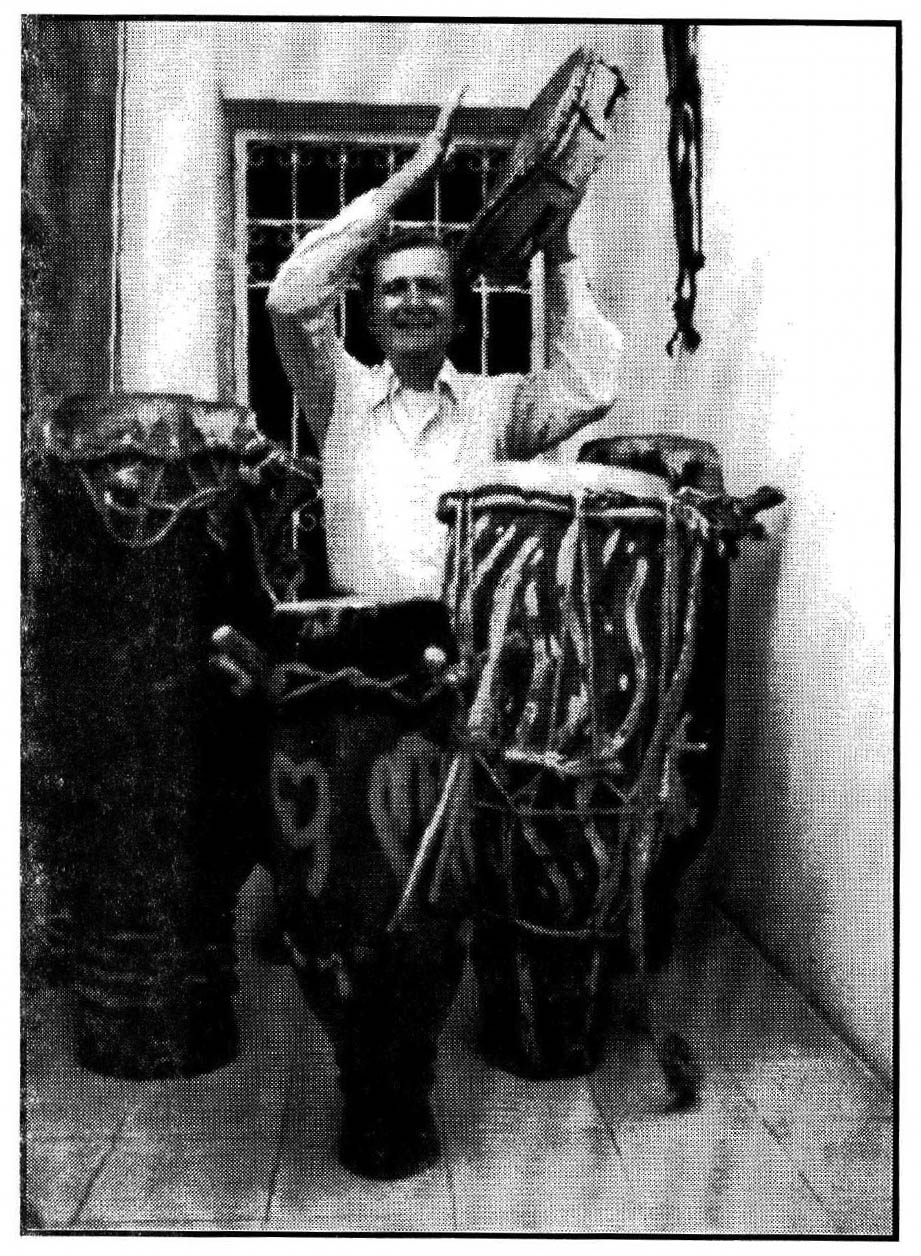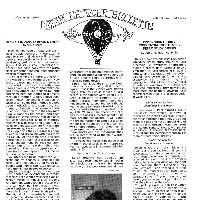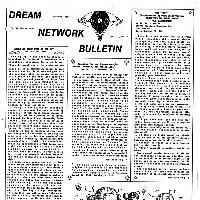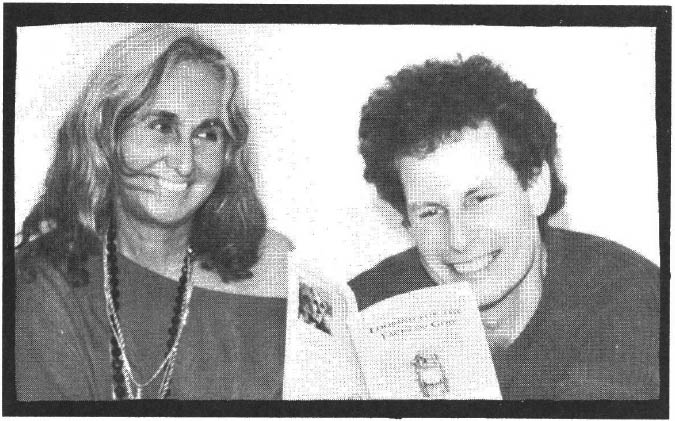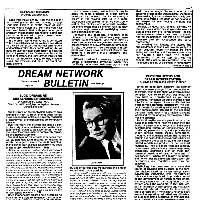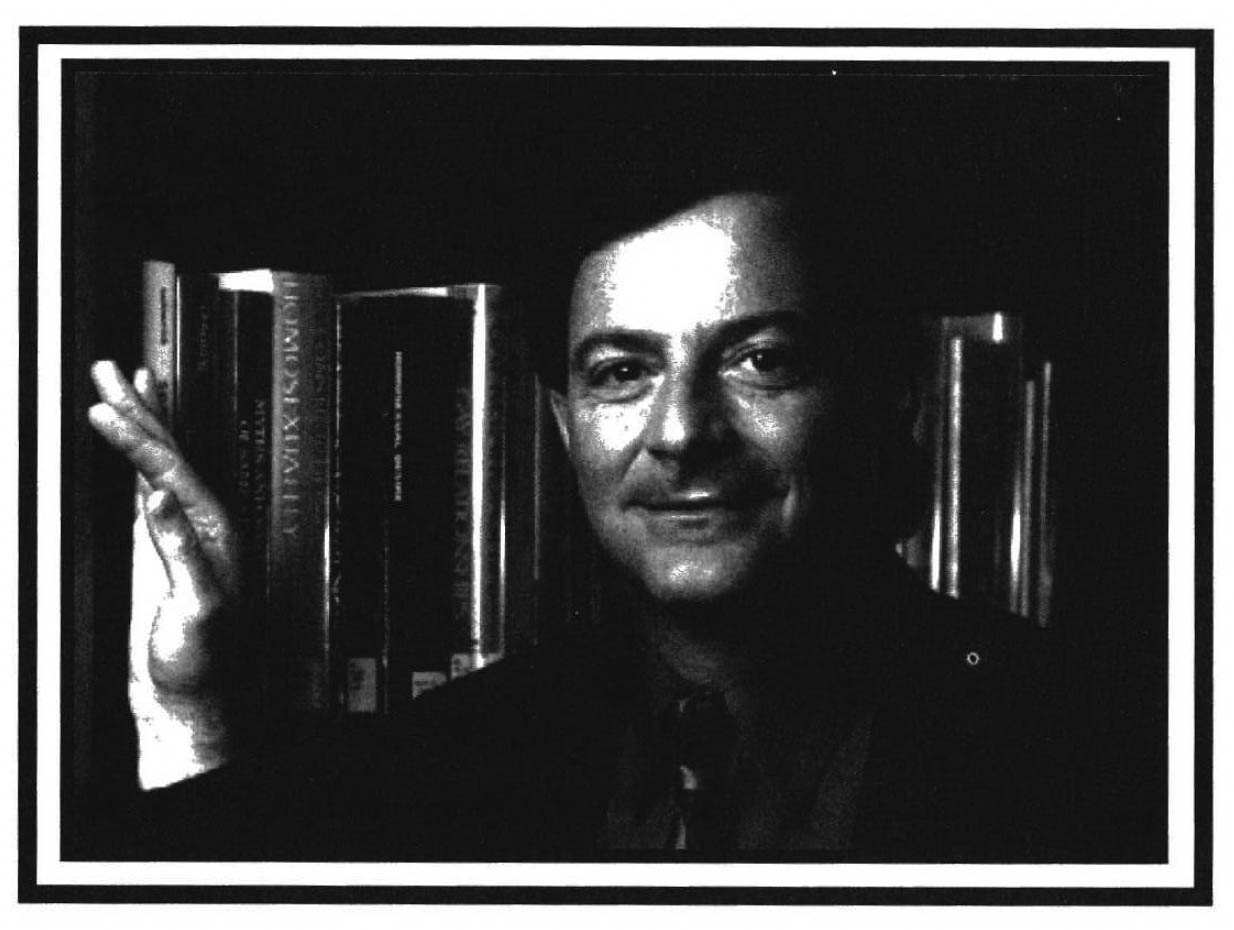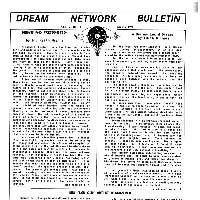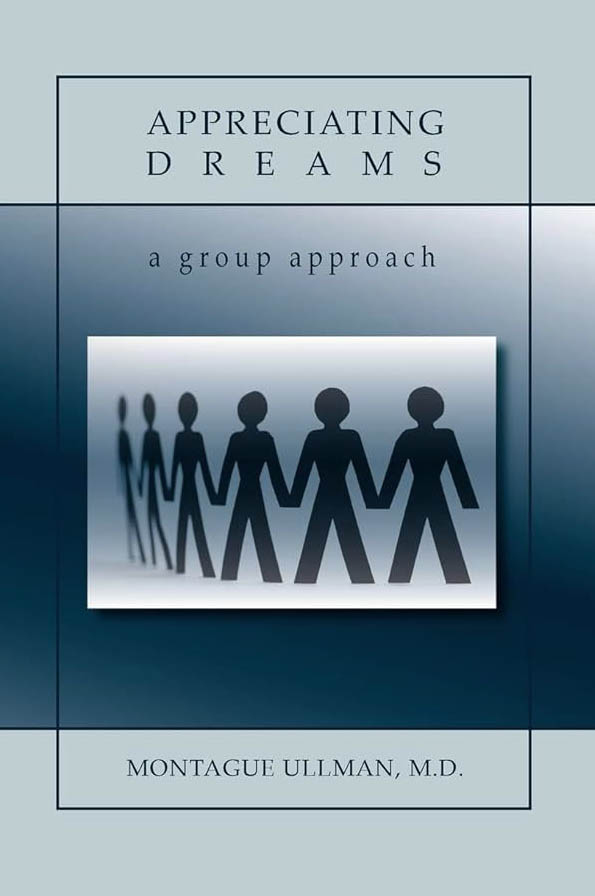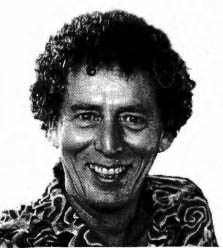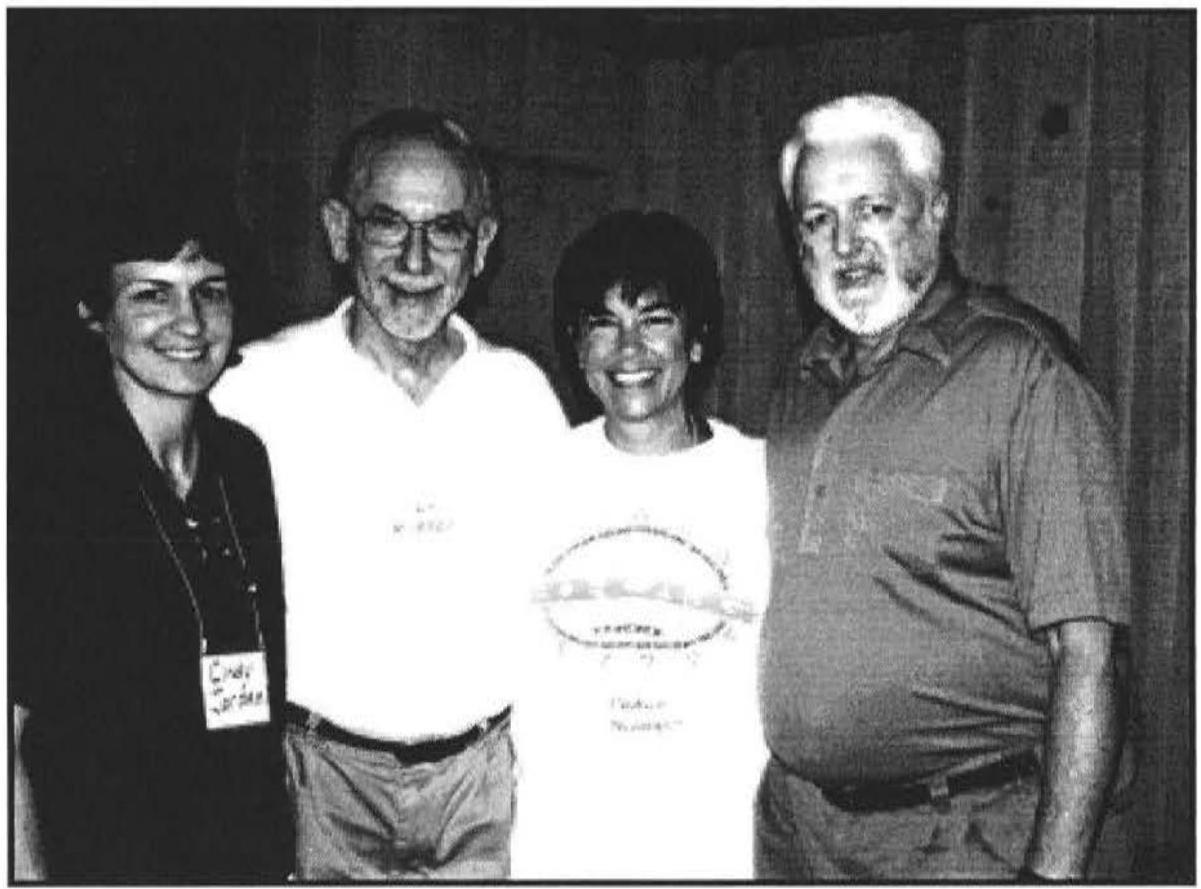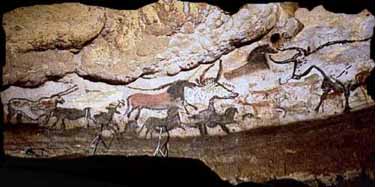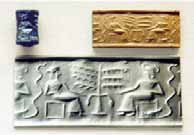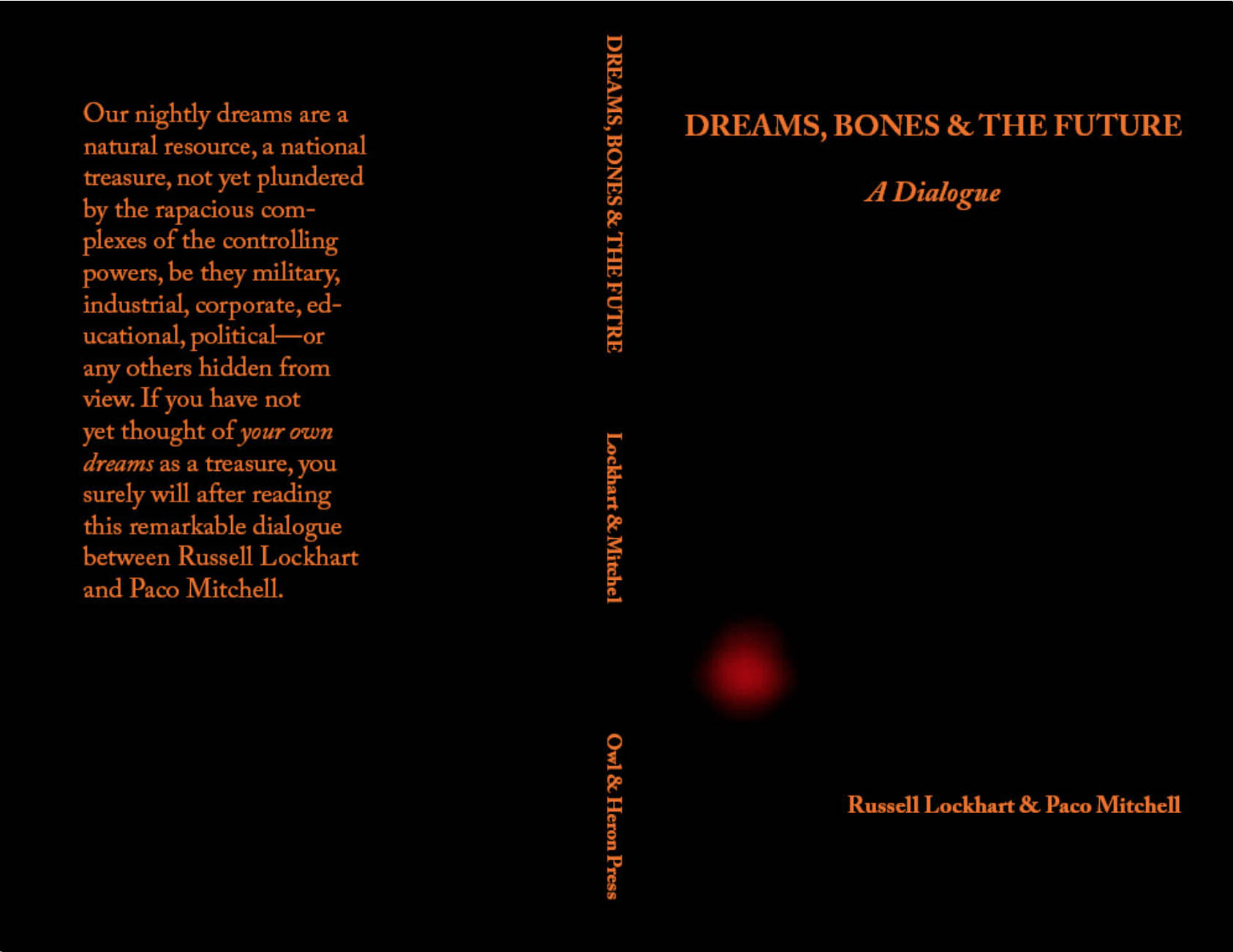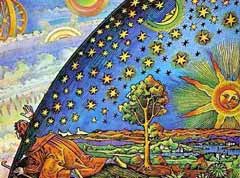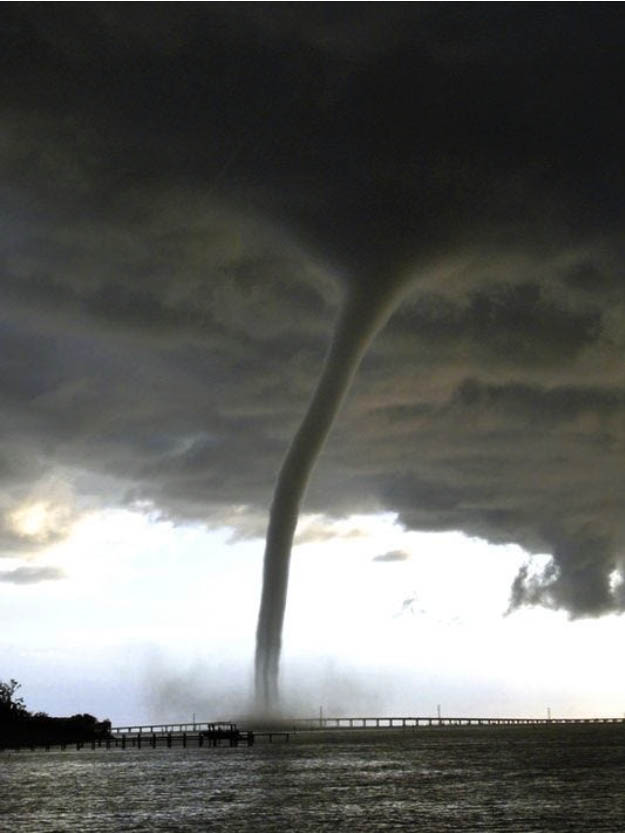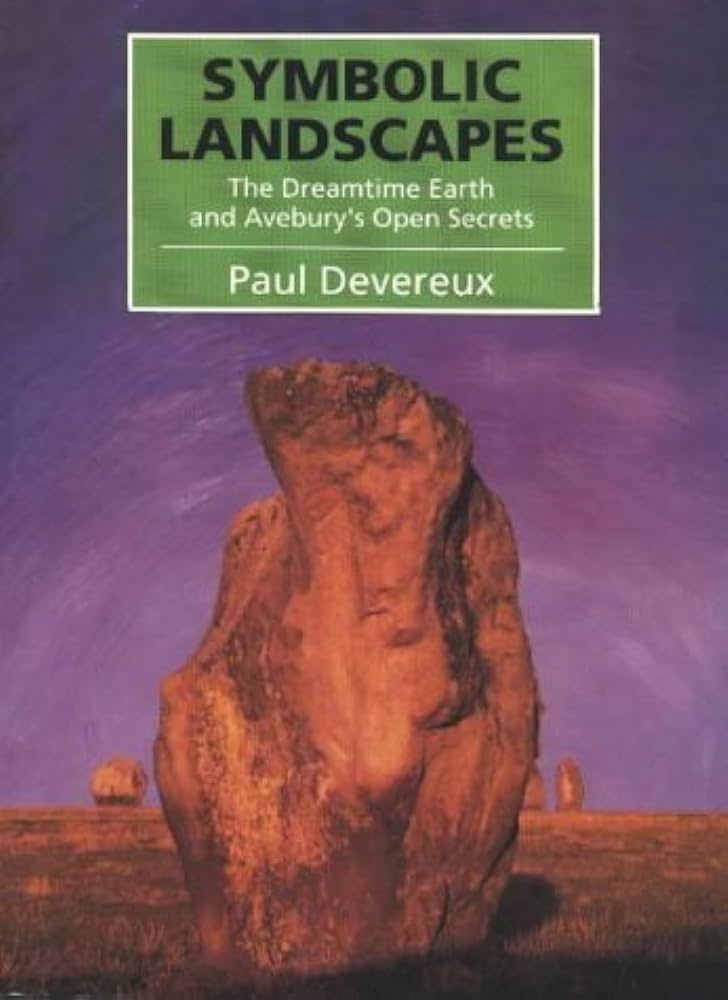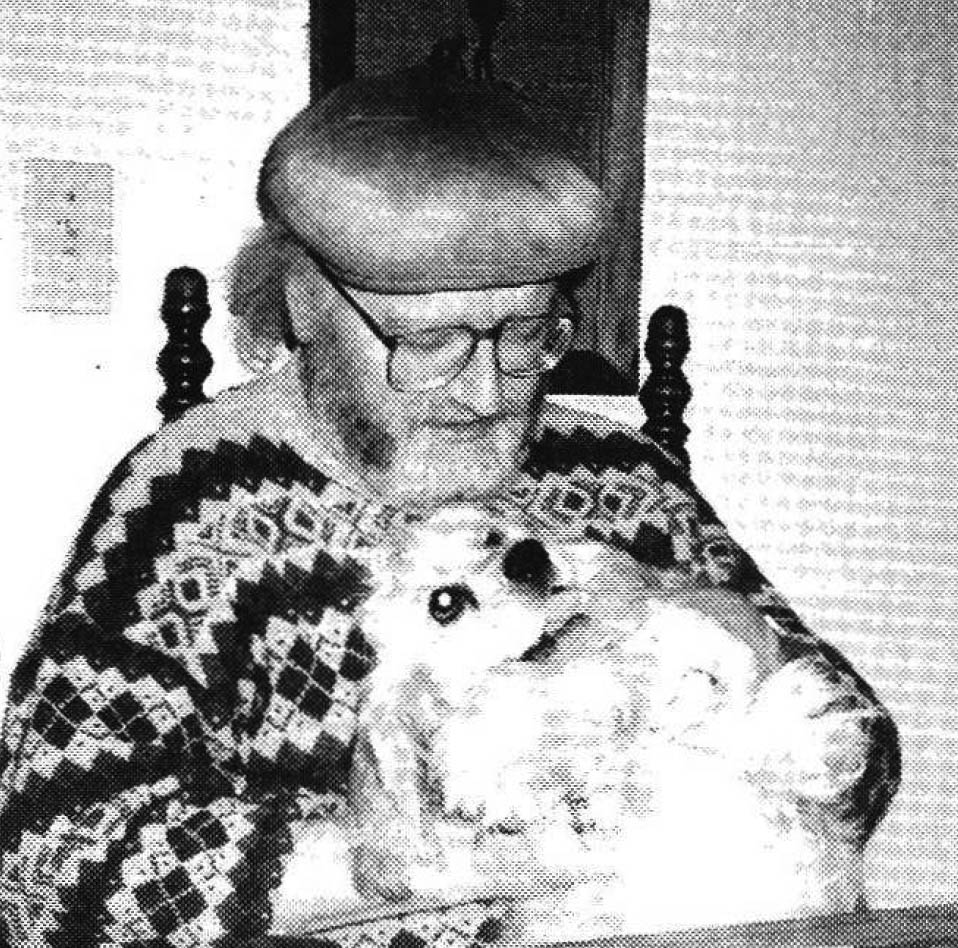
I can feel a yearning to make a place for hearing our dreams and their poetry, a place for the "re-enchantment" of the world. To have psyche's speech heard only in consulting rooms will not suffice in the times to come; psyche's voice must be heard in the world, enacted and incarnated in the world. -Psyche Speaks, pgs. 88-89
R.O.: I recently attended a gathering of Northwest Coast Native tribes on one of the Queen Charlotte Islands in British Columbia, which, in essence, was a celebration of cultural revival and a sharing of Visions through storytelling, song and dance. I was able to see with vivid clarity - as regards dreams that come for community, that are intended to be shared on that level with others - how that's creativly integrated in Native American culture. It's also helped me to see the abject poverty of our culture in this respect. We simply don't provide enough places for the 'enacting' of the dream to occur at this time.
I perceive, from the materials and information that come to the matrix of the Dream Network, that there is a growing desire among the general population to engage more seriously in their dreams; the satisfaction of that urge is trying to be satisfied in a variety of ways. It seems to me that what we have happening now in terms of where people can go with their dreams, is to private therapy with depth, transpersonal and Jungian therapists, like yourself... to dream groups or to the many individuals who cluster around the philosophy espoused by this publication... which, in essence, says that dreams are a common human experience and we do not need to rely, exclusively, on professional help to engage with our dreams and to integrate our dreams into our lives and culture.
I'd like now to go directly to a quote from your book, Psyche Speaks, which stimulated the request for this interview:
"To have psyche's speech heard only in consulting rooms will not suffice in the times to come; psyche's voice must be heard in the world, enacted and incarnated in the world."
Given your statement and given that we are demonstrating a collective, cultural urge - or impulse - toward 'enacting and incarnating psyche in the world' - how do we go about creating that bridge into the home, the community, our schools... from your perspective? What are the safest ways to bring psyche's voice 'into the world'? How can we achieve this in ways that are creative, healing and not destructive.. given that we are talking about reopening considerable repression of emotions and... soul?
R.L.: The issues that are involved are so large and in many ways so crucial, that it's difficult to know quite where to start.
There's a great distrust of dreams; there has been forever, to one degree or another. Dreams, I think, are relatively subversive and so they are likely to be a threat in many different ways to whatever is the established order... whether that is the established order of the personality, or of a group, or of the larger collective of society. From my point of view, almost every dream has more to do with the future than with the past. Since most individuals, groups and societies function in a preservative mode, preserving a sense of self, of identity, a sense of collective identity... there's not a lot of tolerance for anything that has the capacity to question or overthrow whatever is the established process.
In my mind, dreams have that function. Not just the occasional collective - or 'Big'- dream that some people have, but every dream has the potential of being a source of the future. And of course, most of the ways of working with dreams have to do with attempts to understand the dream in terms of the past.
A lot of good work can be done that way; it's not that I'm questioning the value of that. What I do question is whether that work serves the dream. There is no question that dreams can be used in different ways and they can be used as vehicles to work and re-work the past. I think any work that tends to do that exclusively fails the dream, and so I am particularly interested in how to approach the dream in ways that will listen for what the intentionality of the dream is, in terms of the future. We can't do anything about the past, anyway; we can do very little about the present. The only thing we have hope of doing something about that is different than just being determined by the past is the future. So, the future, not being known, forces- I think - a certain way of listening to the dream that is not from the standpoint of knowledge, authority, understanding and so on... but, simply listening to what the dream has to say.
Now that sounds very simple but, in fact, it is very difficult, because most of our attempts- whether on our own or working with someone else- tend to force the dream into some understanding that we already have. And, of course, it's much easier to pull the dream into some constructive understanding than it is to truly listen to the voice of the dream. True listening has the potential for reorganizing our whole psychology and sense of ourselves. Dreams have that potential, but it's anxiety provoking to open yourself that fully to a dream and so there are a lot of reasons for trying to bring understanding to the dream, which amounts, very often, to forcing the dream into already preconceived notions.
That effort of listening to the dream- and particularly to its intentionality, to its "future seeking" value-I'm not sure that is the preserve of the professionals at all. Nor am I sure whether professionals are necessarily the best people to be listening in this way. Artists listen in this way. Poets listen in this way. Perhaps I should say some artists and poets. And so these activities- art and poetry- tend to be the places where you can see what's heard that's anticipating the future, more so than what you see in professional journals. If you look closely at what's happening in some art, what's happening in some poetry and some literature, what's happening in some of these creative processes... then you can start seeing the future in a way much more clearly than you can in what is presented as overt plans for the future. Our 'plans' for the future don't work nearly as well as some of the anticipations that one sees in art and poetry.
One can see these anticipations of the future, as well, in the dreams and visions of people in different kinds of psychotic conditions, and in certain kinds of extreme human conditions, in certain extremity conditions altogether. And most of these things get seen as illnesses, or as problems, or only as reflecting problems... problems to be fixed, problems to be coped with or adapted to, etc. So, it's hardly surprising that where there are sources of power - whether that's political or financial power - the dream is hardly listened to in such places.
I think, in the present world, the dynamics of money are probably the main determinant of most of what transpires. And for that reason, it seems significant to me that I can make a great deal of money interpreting or working with people's dreams in the ways that I do. And I know a whole lot of people who can make a whole lot of money doing that.
But, I can't make any money from a dream. Nobody's going to pay me for a dream. If I tried to sell you a dream, you probably wouldn't buy it. If I tried to sell you a poem, you probably wouldn't buy it. If I try to sell you a dream that I think is important, that somebody just told me, you wouldn't buy it. And yet, these are the most valuable things we have. And nobody knows it. It's not that I want to be paid for my dreams; I don't. And I don't want to sell dreams. But in many ways, I believe that dreams are the most valuable things that we have and I would hope that the pervasiveness of money dynamics - as it seems to be developing in our culture - doesn't find a way to commodify dreams.
There are dreams that I have heard which I think people need to hear. One of the things I want to do is to try and make some kind of place for such dreams, so that these dreams can be heard. I want to do that in some way which is not going to be influenced by the dollar; I don't know how to accomplish that but it's a project I have in mind. I don't want to interpret these dreams; I don't want to write a professional or Jungian commentary about those dreams. I could surely do that, but I don't want to. I want the dreams to be heard. I would like, somehow, for the dreams to be heard all over the place!
So, some of the things that are going on, because of the computer network, the global highways, the ways we are able now to instantly communicate with vast numbers of people, I want to be able to use it. I don't want to sit back and just say that's horrible, because it's not. I do want to make use of computer technology as a way and means for the psyche to be heard. I think that psyche is going to be heard, in any event. The problem is whether we can hear it and get the message... or have the message forced on us.
The psyche doesn't stand for not being heard for very long, whether that's in an individual's life, a group's life or a culture's life. The kind of community that can be generated from genuinely hearing what's going on in the psyche is an extraordinary community. This doesn't have to be in the same place, geographically, because we're not in the same place geographically anymore. That idea is I gone. Your real community in the future is going to be with you in Utah, me in Lake Stevens, X in Nova Scotia and Y in New Zealand and somehow we are going to be able to communicate and be an organic community, even though we're not in the same place. Finding ways of facilitating that sense of community is going to be a very interesting thing to do.
I feel more in community with people I've never met, never seen, who are in Europe, or in Russia or South Africa, than I do with my neighbor across the road. And I can have two reactions about that: I can say that's horrible, we've got to have community right around us; but, what I've come to feel is that I don't want to insist on that anymore. First of all it's not happening organically. What is happening organically is a kind of psychic inner connection with people all over the world and I feel very connected with them.
Certainly, I'm not in opposition to having community close at hand in my small town, but it doesn't seem to be happening. I don't know whether that's peculiar to me or...
R.O.: I don't believe so. I'm hearing everywhere I go that there is no such thing as community anymore, except when a crisis occurs. I am experiencing it myself. It's a great loss, whatever the causes. I wasn't I aware of how much I miss a sense of community until attending the gathering I mentioned earlier. The setting was on an island in British Columbia. There, most people do not have, nor need, cars. Every day was a celebration of people in the streets, walking and genuinely greeting one another. That in itself was incredibly nourishing and made me painfully nostalgic because that's the way it used to be...
R.L.: I'm a strong believer in the organicity of community. The way in which community is genuinely formed is not to press the idea of community by saying we've got to have community and kind of force it in some way. That doesn't work. Community doesn't even mean that if you think about the word. The munis part of that word means "gift"; the comm part of it means "together." So community that is organically based is based on what we give to each other. When you give something to another person and that gift starts circulating - that's the key thing: the circulation of gifts - then, you have community.
Now, where does that happen? It certainly can happen with your next door neighbor, but it often doesn't. That's why now, what I can give, is to people that are not necessarily next door. The person next door doesn't I necessarily want what I have to give and if I give it to them it doesn't circulate, it stops. So, what's required is to give in a place where the gift will keep moving.
Louis Hyde, in his book The Gift, a crucial book in this whole sense of things, pointed out one problem with the early Puritans is that when the Indians would give them the peace pipe, the Puritan would put it on his mantel. The gift became a possession. When the Indian came by the next time and saw the pipe still there, he took it. So, Indians became "Indian givers"; "you can't trust an Indian."
But, what the Indian was seeing was the death of community and that was very disturbing. The Indian understood that if everyone takes and possesses, we don't have community, we have power. That acquisitive power aspect, when we are in that mode, we can't give and therefore, we can't be a basis of community but only a basis of power. Communities that are based on power - that attend to the flux of power - are quite different than communities based on the flux of gifts. This is probably the most crucial thing in terms of how to find out where community is in the modern world.
This is why I think with the kinds of technological communication - which is, of course, the same word that this is going to make possible a vast interaction of everybody in the world ... and communities are going to be quite different than what we've imagined them to be in the past. I had a dream some years ago, one of those voice dreams, you know, that has a compelling truth quality. It said, "God is in the computer."
R.O.: That's an awesome statement to consider. A dream voice once said to an acquaintance: "The unconscious is God."
R.L.: It's important to notice the dream does not say the computer is God, it says God is in the computer. Now there are certainly ways in which computers function as gods, lately. You go into the bank, and if the computer's not working, nothing is happening. They can't even do anything by hand anymore. So, the computer is sort of god there. I just read a book recently called The Death of Money, which gives a good picture of what happens when computers a reconceived of as god and instead of the dollar bill now being god, it's electronic money that has become god.
Now, that's not quite the same as what my dream was saying. Because of that dream, I haven't been able to look away from what's happening in all the technological revolution, because if I trust the dream I have to trust the idea that God's in there. If God is in there, in the computer, then there's a certain sense in which the computer is a new church... or is the place where one might find God.
This helps me in my relationship to technology and all the things that are coming in technology. In fact, the revolution in technology, which has been based largely on processes of miniaturization, has had the corresponding effect of increasing the power of individuals. The effects of this will escalate dramatically. It's happened within the last twenty years, for the most part. It has basically rendered the idea of countries, governments, large power blocks... as being relatively ineffective, in comparison with the power of individuals. Even economically, the power of individuals is increasing. It is now possible to create wealth more quickly with the idea an individual has than organizing large masses of machinery or materials or such things. A single idea, now, can produce more wealth almost instantly than a generation of 'stuff!'
R.O.: Stuff... from the Industrial era?
R.L.: That "stuff" was characteristic of the industrial era and now we are changing into an information era. It's a knowledge revolution and knowledge is really the basis of power. You can't bomb knowledge. Once all the factories and means of production become robotized anyway, there's not going to be much point in bombing them. The whole idea of large bombs is going away and with it, of course, what it has supported. The huge global structures of war are becoming obsolete. We are in the process of seeing the obsolescence of large scale governments and, of course, in the process of that there is total chaos! That, coupled with the breakdown of what has contained so much, historically - institutions, traditions and so forth - leads to the present chaos. This situation, I think, often generates a kind of nostalgia and so we're trying to put things back together the way they were and...
R.O.: They won't fit!
R.L.: Exactly... and there's no going back. That going back is also related to trying to relate to the dream by dealing with it with what we already know. The past. I'm not so sure that embracing the future works by embracing the past. I don't think, for example, that the means of understanding the coming times are necessarily going to come by trying to interpret it in terms of what's already past.
Using, for example, Greek mythology. Greek mythology was the stories of the Greeks as the psyche was then producing stories and art. Why would we want to take just those stories and say these are the stories of the psyche when the psyche is producing stories all of the time. New stories, different stories. Obviously, some with the same themes... but in new contexts. It's more a point, now, of trying to sensitize ourselves to what is coming and how to embrace the future, rather than being fearful about it. These things that are being developed are the tools of the future and like any tool, you can hit somebody over the head with it or you can do something creative with it.
So, the problem we have is still the same problem. We have to have a kind of psychological development that is up to the development of the tools, or we're going to have a massive problem. And this, I think, is probably the source of much of the problem: the disparity between where the tools and the power are and where most people are. Many people in the world are still living 200 or maybe 2000 years ago. Living 10 years ago is dangerous to your health! D
R.O.: I would like to get some clarifications for Dream Network readers on what you've said so far because you are introducing some new, timely and viable ways of looking at things. You are saying that we must listen to the dream as a way of embracing the future. Do you include all dreams?
There are now people who are identifying different types of dreams... such as precognitive dreams being those which show us a future event or condition ... but I hear you saying that you are listening as though all dreams are giving us guidance into future time.
R.L.: Yes. What I would like to propose is that all dreams, regardless of their seemingly different types, are ways into the future, are preparing for the future. This is something I'm in the process of working on in a book I'm currently writing. It may seem a bit odd as a way of looki ng at the dream but conceiving the dream this way brings up the question of how one is to relate to the dream and, again, putting things in an extreme form as a way of making a point, all dreams are to be enacted. Now that seems a bit dangerous and radical...
R.O.: And challenging!
R.L.: Yes. Some might say stupid. If you have a dream that you go over and kill your neighbor, does that mean you go over and kill yo ur neighbor? Is that what I mean by enacting? Obviously, that's not what I mean. Talking about every dream as having something to do with the future, does not mean that one becomes a slave and simply act out the dream. There's a world of difference between acting out and enacting and this is the crucial point. Enacting the dream requires consciousness. A conscious relationship to the dream, a kind of eros with the dream. This is totally absent when one is simply acting out the dream. And that's the chief difference between what one might see as a dangerous suggestion... that one just go act out what the image of the dream has shown. That's not enacting the dream at all. At the same time, when the dream pictures you killing your neighbor, what do you suppose it could possibly be to enact such a dream? What would that look like? What would you do?
R.O.: First of all, make a determination about what the dream means. Who is the neighbor? What does the neighbor symbolize? If one were to look at the neighbor subjectively, he or she would no doubt be showing some aspect of oneself that needs to be disposed of. If looked at objectively - if there is, in fact, a serious problem with the neighbor, some righteous conflict resolution appears to be in order.
I understand what you are asking. I encounter this all the time... peole who are so inclined toward the quick explanation, toward the literal interpretation of dreams. That's one danger we face, it seems, as more people become interested, considering that by far the majority of people will not or cannot access someone who is in a professional capacity. The concern becomes how to educate, how to get the information out, in order that people are led to the quality resources, to the right information. This, so that we may begin doing what really is simple and intuitive, but since we have been deprived of - and are just in the process of reclaiming - this precious side of our nature, it becomes a considerable and sometimes lengthy process. Providing quality information, education and resources are joyful and immense responsibilities for all of us who are involved.
Before I ask the next question, I'd like to reflect a bit on what you've been sharing. First, I totally agree that we are in a position, maybe for the first time... maybe... in the history of the human species on this planet, where we really don't have any precedents in history - even yesterday - which can help us move into tomorrow, into the future. What you are introducing is a new concept, that we must begin recognizing that the time for reaching into the past - into the places where the woundings have occurred - need, now, to become those transformative experiences which become our personal mythology. Those which can carry us into the creation of a new way. It seems that this is our challenge... in the midst of the present-day chaos.
You have indicated, in response to the question of psyche's voice being heard in the world, that the kind of messages we're receiving from psyche, those that are ready to be heard out in the world, are the dreams that don't want or need to be interpreted. Are you saying that if is the dreams, which Jung referred to as coming from the level of the collective unconscious, that are ready to be heard ?
R.L.: Let me say a couple of things about this. I would like to say that every dream needs to be heard. What I mean first of all is that the dreamer needs to hear the dream. The dreamer needs to listen to what the dream is saying. That's the first place of hearing is the dream. A lot of people don't hear their dreams, so, there's a whole part of a person's life that they're not hearing. There is a collective task to get people hearing their dreams. I encourage everyone to listen to their dreams... so, that's the first place of hearing and it's very deficient at the moment.
As many people as are interested in dreams, or who are in therapy at this time, there is really very little of it going on in the world. That's the first place of hearing that needs to be animated. I mean, we compulsively go to the TV or the movies or whatever and we already have a theater going on inside us all the time. And it's free! It's one of the few things that the economy hasn't quite insinuated itself into, as yet. Although, in many ways it is, because we are so distracted by the economics of TV and movies and everybody's desperately involved in those things, when there's a whole source of such things going on inside that doesn't cost a dime!
So, there's that first place of hearing. Every dream needs to be heard. That creates the channel, as it were, for the objective psyche, or the divine or whatever one wants to call it, to come in. I don't care what one calls it, there is something there to be heard from. No matter how prosaic any dream seems, it's the beginning of a hearing of something else and it's that something else that needs to be heard.
I wouId go so far as to say every dream needs to be told. And how do you tell it? Well, first of all, you have to tell it to yourself. Just hearing it is one thing but telling it to yourself is another. And by telling, here, I mean an act of consciousness with the dream that has certain features. One must really become curious about the images of the dream. That one goes into the dream again, perhaps imagining or allowing the dream to work on us in our waking life, not just in our sleeping life but in our waking life and allowing it to work on us in such a way - what Jung called "Dreaming the dream onward," or technically, active imagination, which itself is a very difficult thing to achieve. Basically, the idea is that it's a way of participating in the dream consciously. It is an act of consciousness of taking oneself into the dream world again and being there, but being there with consciousness now. That's another step one takes with the dream. There are many steps.
One can make something from the dream, manifest the dream somehow in the world. Even the dream where one kills one's neighbor. If the dreamer were to paint this image of killing the neighbor, I can guarantee you that things would start stirring that s/he didn't know were there... that s/he needs to know are there, for their future. To enact the dream in a painting and let the paining speak to us and let all the actions that are involved in painting speak to us... brings up all sorts of things that are the stuff of our future.
So, there are many ways of enacting the dream and many ways of telling the dream. Telling our dreams to our partners ... and I don't mean 'dumping' the dream... I don't mean saying the dream to someone else as if they're then supposed to do something with it. We can't really tell the dream until we've heard the dream as fully as possible.
If we dream and wake up and tell our partner... nothing has happened. We haven't heard the dream deeply enough in order to tell it deeply enough. We've just put it on a conveyer belt and sent it along. That's not what I mean by telling a dream. Hearing is a very deep inner process and telling from that place of hearing so deeply about any dream, it has an inductive effect on the other person. It's related to the kind of art, for example, when we see it, it produces the urge to paint or to write-not the urge to possess - but the urge to create. When art has that effect, then art is serving its purpose for the future. It's bringing the fruit of the future by doing that. Our dreams are the same way. Putting a dream on a conveyer belt and sending it out, that's not what I mean. If we hear it deeply enough and tell from that deep place, then we induce an erotic connection to the other. That kind of telling is very erotic and it is what makes for very deep relationship.
A community that comes from that kind of sharing, giving the gift of a dream to another... after one has heard it as deeply as possible... to me, that is the idea I sequence of things in bringing the dream to the world.
R.O.: In that way it relates to the community of giving that you were referring to earlier.
R.L.: Yes. And so, I think that the age of Aquarius being upon us, it's useful to use the imagery of Aquarius as being characteristic of what this might mean. Aquarius is a waterbearer. It is not quite clear whether Aquarius is male or female and so gender is not so much an issue. The issue is the bringing of the water. What I imagine this to be - and where the dream is the vehicle - is that, opening ourselves as deeply as possible to the other is the way we can fill the jug. Then, we take that jug to the common pool and we pour that jug into that calm pool made of these pourings of each of us. That is the water of community. Our gift to the common pool.
R.O.: Sounds like soul food to me!
R.L.: Soul food it is. Dreams are free and they have to be freely given. The community that generates out of that, the gift giving of that, is going to be something we've never seen before.
R.O.: It reminds me of what Kilton Stewart brought to us about the Senoi people. I recognize that what Stewart shared has been questioned. .. but the paradigm is viable.
R.L.: I don't care whether Kilton Stewart's work is a fantasy! The ideas are psychologically correct. They are good images for what is necessary in the times to come. That we go to that place of psyche and bring from there the gift to the community.
R.O.: So be it. Thank you, Russell.


